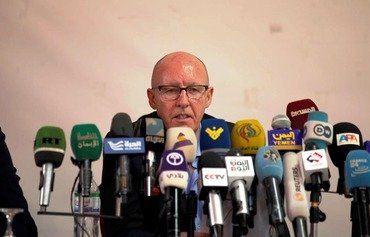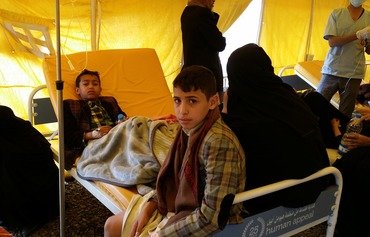By fully funding the $2.1 billion 2017 Humanitarian Response Plan for Yemen, launched in Geneva on February 8th, international donors can avert a potential famine in the war-torn country , Yemeni officials told Al-Mashareq.
"Two years of war have devastated Yemen, and millions of children, women and men desperately need our help," UN emergency relief co-ordinator Stephen O'Brien said during the launch of the plan.
"Without international support, they may face the threat of famine in the course of 2017," he added, calling on donors to sustain and increase their support.
Need for unimpeded access
"Humanitarian partners are ready to respond," he said. "But they need timely, unimpeded access and adequate resources to meet the humanitarian needs wherever they arise."
O'Brien, who met with the warring sides in Yemen on Monday (February 27th), appealed for both parties "to facilitate commercial imports of food, fuel and medicine from all ports and a resumption of commercial flights" to the country.
According to the UN Office for the Co-ordination of Humanitarian Affairs (OCHA), the 2017 plan for Yemen is designed to assist people facing acute needs and those most at risk of slipping into acute-need status.
The war has accelerated the collapse of key institutions and the economy, thereby exacerbating pre-existing vulnerabilities, OCHA said.
This has left 18.8 million people in need of humanitarian assistance. An estimated 10.3 million are acutely affected, and need some form of immediate assistance, with food, medical services, clean water and sanitation or protection.
Nearly 3.3 million people, including 2.1 million children, are acutely malnourished, and two million people remain internally displaced.
According to the Integrated Food Security Phase Classification (IPC) scale, famine exists when at least 20% of the population in a specific area has extremely limited access to basic food; acute malnutrition exceeds 30%; and the death rate exceeds two per 10,000 people per day for the entire population.
Funding the plan will help to alleviate the suffering of the Yemeni people, said Yemen's permanent representative to the UN Ali Mujawar during the launch of the plan.
A unified relief response
Deputy Minister of Planning and International Co-operation Mutahar al-Abbasi said the ministry held joint workshops with the UN and humanitarian organisations to arrive at a unified vision in relation to the cost of the 2017 plan.
"The UN set the humanitarian response plan at $2.1 billion, which is below the required amount, as there are 19 million Yemenis who are in need of food aid, including 14 million who are at risk of starvation," he told Al-Mashareq.
This has been determined via reports and field surveys conducted by the UN in collaboration with various parties, he said.
The UN and affiliated humanitarian organisations have so far been able reach three million Yemenis and deliver food aid to them, he said.
He stressed the importance of expanding the recipient base, noting that those who have received food aid account for only one quarter of those who need it.
Concerted international efforts are required to both help the Yemeni people on the humanitarian level and "press for a settlement to the ongoing war", he said.
The 2016 Yemen Humanitarian Response Plan called for $1.7 billion and received just 57.7% of this amount, "which adversely affected the size of the segment targeted for this aid", al-Abbasi said.
Local councils, provincial authorities and civil society organisations contributed to the success of the delivery of food aid to eligible recipients, he said.
In addition to those who suffer from acute malnutrition, "two million people are still internally displaced", said OCHA Yemen public information officer Zaid al-Alayaa.
Problems at al-Hodeida port
Since early January, Yemeni forces have pressed a major offensive aimed at recapturing Yemen's Red Sea coastline from the Houthis (Ansarallah).
UN humanitarian co-ordinator in Yemen Jamie McGoldrick warned last week that the escalation of conflict on the country's western coast "is coming at a great cost to civilians".
Unexploded rockets have landed inside the port of al-Hodeida, which is controlled by the Houthis, he said, "reducing even further the number of ships and imports" vital for Yemen's food supplies.
UN-affiliated aid organisations continue to send ships laden with food and other relief to al-Hodeida, but more than a dozen have been held up and subjected to delays , said Studies and Economic Media Centre (SEMC) chairman Mustafa Nasr.
Al-Hodeida port is a critical conduit to population centres in the country's north.
Nasr called on the UN "to change the route of the aid vessels to dock in the port of Aden instead of the port of al-Hodeida, so the government, in collaboration with the relief organisations, can deliver the humanitarian aid to the targeted recipients without it coming under pressure from any other party".

![Aid distribution by a UN-affiliated relief agency is undergoing in al-Tahita area in al-Hodeida province. [Photo courtesy of Angela Abu Asba]](/cnmi_am/images/2017/03/01/7366-yemen-aid-distribution-600_384.jpg)






Some officials are providing assistance only through their own interests. What’s going to happen to the poor?
Reply2 Comment(s)
An urgent call for help. Refugees in Yemen are undergoing unprecedented tragedies. They’re all isolated from the world, and nobody knows about the sufferings of refugees, especially those coming from Ethiopia’s Oromo people. Their sufferings haven’t been covered by the media. Even the Yemeni media are hiding the sufferings of refugees in their country so they can distribute aid to their people. Therefore, we need the world to look at the sufferings of refugees in Yemen.
Reply2 Comment(s)